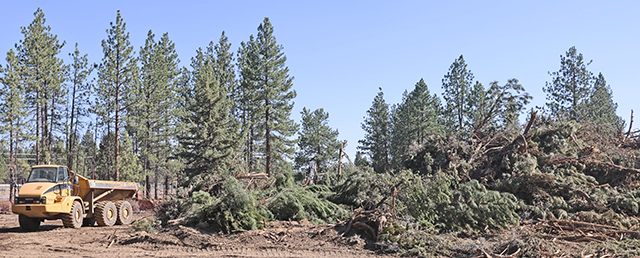With forest camps cleared, Deschutes County faces ripple effects of homelessness crisis
Published 5:26 pm Wednesday, May 7, 2025







Officials weigh tougher rules as displaced campers scatter to new locations
Nearly one week after people living in vehicles were forced to leave the Deschutes National Forest southeast of Bend, a row of rundown RVs and trailers remained parked on the side of China Hat Road just outside a locked gate Tuesday. Each was plastered with a bright orange slip of paper with the same message: Move in 24 hours or be towed away.
The warnings were delivered by Deschutes County Sheriff’s Office deputies on Monday and Tuesday in an effort to clear the road where many settled to figure out where to go next after leaving the forest.
As of Wednesday, no one remains in the part of the forest that was closed and from which homeless campers were evicted, said Kaitlyn Webb, a spokesperson for the Deschutes National Forest. No arrests or citations were made during the closure process, she said.
Trending
It’s the first time in the better part of a decade that people are not camping in the national forest in the China Hat Road area, once home to hundreds of people. The closure will allow the U.S. Forest Service to complete a 34,000-acre thinning and forest restoration project that will reduce the risk of a large wildfire burning through the area toward the city.
Now, the burden of a homelessness issue that had long been pushed to the forest is shifting. Deschutes County and surrounding neighbors are feeling the immediate impacts.
“It’s evident that what was once a clear and present danger in the forest service area has now become a clear and present danger in my backyard and my neighbors’ backyard,” Frank Hall told the Deschutes County Commission on Monday. Hall lives on a 2-acre lot bordering the portion of China Hat Road a short distance from the closed gate, where about 20 vehicles were still parked as of Tuesday.
Hall fears that more-permanent camping areas will form if the county delays enforcement.
“There’s no reason to be scared of us,” said Paul Osanto, who has lived most of his life on the streets, and most recently at China Hat. “We’re not out to get anybody.” He’s hoping to get his vehicle in working order so he can move back to his family in Washington state.
Sheriff grants leeway for people to move
Trending
Additional people dwelling on county land as a result of the China Hat closure comes as the county looks to control camping across large swaths of its own property across the region. County commissioners have expressed an urgency to remove people camping on hundreds of acres of land east of Redmond after the county’s community development department identified the area as an “imminent public health and safety hazard.”
An ordinance passed by Deschutes County in 2023 prohibits camping on county-owned land for longer than 24 hours.
The 2024 Grants Pass decision by the U.S. Supreme Court put anti-camping rules on firmer legal footing, although they still must be “objectively reasonable” according to state law.
People evicted from China Hat are now caught in the middle of a “Whack-a-Mole” game in which they will likely be pushed out of any place they go, said Jessica Gamble, a homeless service provider who has been active in helping people move. Many people had to leave belongings behind and are struggling to find their footing after camping in the same place for several years.
“Folks that are trying to recover with this closure, they’re going to need more time,” Gamble said.
Tuesday evening was a scramble for Gary Huntsman, who was attempting to help four of his friends tow away their RVs and trailers with his SUV. Huntsman’s own car was packed full of belongings; he had recently left China Hat after living there for four years.
Towing the RV would be a risk. Neither Huntsman’s SUV or the RV had a registration. He was afraid he and his friend would both lose their shelter. But staying at China Hat any longer would also be illegal.
However, the Deschutes County Sheriff’s Office has so far respected people’s efforts to move. Despite delivering 24-hour notices earlier in the week, no trailers had been towed by the sheriff’s office as of Wednesday morning, according to Deschutes County Sheriff Kent van der Kamp. The trailers are technically in violation of a county rule that prohibits parking vehicles in the right of way for more than 72 hours, but law enforcement has the ability to use discretion in how the rule is enforced, he said. He said the sheriff’s office plans to hold off on towing as long as the campers continue to make forward progress toward moving their vehicles somewhere else as homeless outreach groups help people by providing car parts and gift cards for gas.
“Our practice of working with people and finding resolutions to how we can make them more successful has been paying us more dividends than writing tickets and arresting people,” van der Kamp said.
Still, options are limited. The only place where people can stay long-term without paying is Juniper Ridge, or “Dirt World,” a swath of city and county-owned land north of Bend where the governments have partnered in creating a “temporary safe stay area” for tents and vehicles to use as the city and county close a large portion of Juniper Ridge to the east. The goal is to help people there move out of homelessness and close the entire area by 2026. It’s not intended to accommodate new campers.
Taylor O’Keefe was parked on the side of China Hat Road Tuesday, with most of his belongings packed into an RV, a trailer and a white Subaru. “I’m supposed to be gone today,” he said.
He landed at China Hat a year ago after relapsing and leaving a sober living facility in Bend.
“What I want to do is find a spot that’s kind of away from everybody and gather my bearings, maybe get clean again,” he said.
“We’ve got to be really firm”
As a result of the China Hat closure, people moved vehicles 7 miles east to a 300-plus-acre vacant property owned by Deschutes County along Rickard Road. Robert Schuur, who lives near Rickard Road, said he had been concerned for years about fire danger from people living in the forest south of him along China Hat Road.
“Now it’s just relocated to the north of where we are,” he said.
According to van der Kamp, only one camp remains in the Rickard Road area after the sheriff’s office responded to the situation and told people camping wasn’t allowed.
It’s possible the sheriff’s office’s position on enforcement could soon change under order from the county commission. On Wednesday commissioners discussed options to “close or limit use of county-owned property” and to establish a temporary “no parking” zone on China Hat Road, Knott Road and Horse Butte Road. The board’s majority indicated it could be in favor of taking a stronger stance on camping, with Commissioner Tony DeBone calling 2025 “the summer of action” on the issue.
Commissioner Patti Adair said she hoped the board could come up with a decision about how to regulate county property.
“We’ve got to really be firm,” she said.
The board decided to put up signs restricting county properties to day-use only, prioritizing locations closer to services where people might be likely to camp. For camps that are already established on county-owned land, the county has to provide notice, as well as an alternative location for people to go, said Erik Kropp deputy administrator with Deschutes County.
The sheriff will have to wait for guidance from the county’s legal department on how to enforce any new orders, van der Kamp said.
Adair has emphasized the county’s millions of dollars of investment on projects to address homelessness. But Commissioner Phil Chang has argued those efforts are far below what’s needed to actually make a dent in homelessness.
The next step is creating a so-called managed camp on a county property in east Redmond, where people will be able to park RVs and trailers legally. Another effort is afoot to rezone private property east of Bend, where the owner is willing to build a large safe parking area for people to go.
“If we clear people out of areas without having established pathways out of homelessness and places for them to go, they will end up in other unauthorized locations, there will be more people complaining — and having very legitimate concerns — about having that activity near them,” Chang said.
















